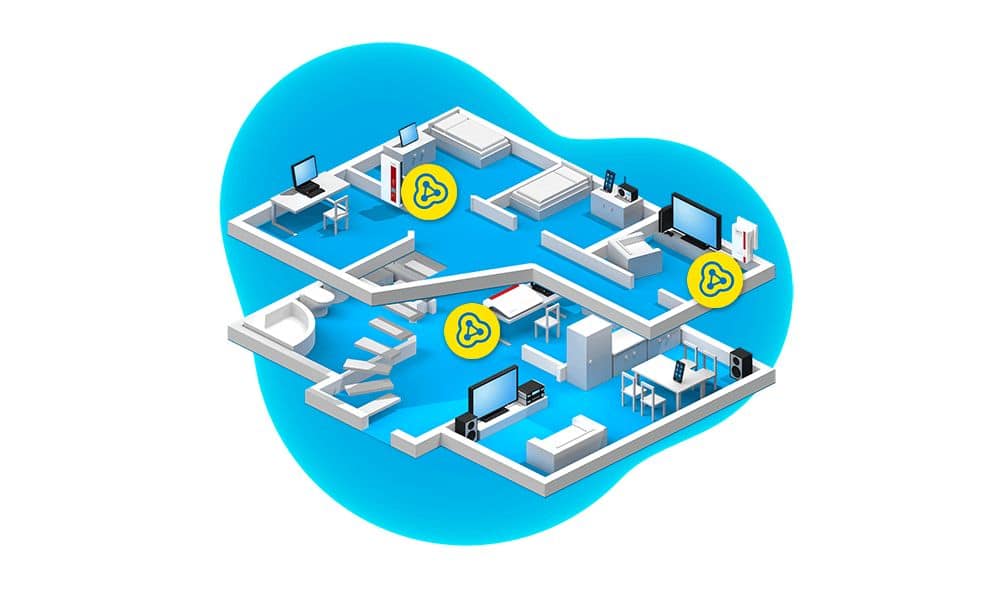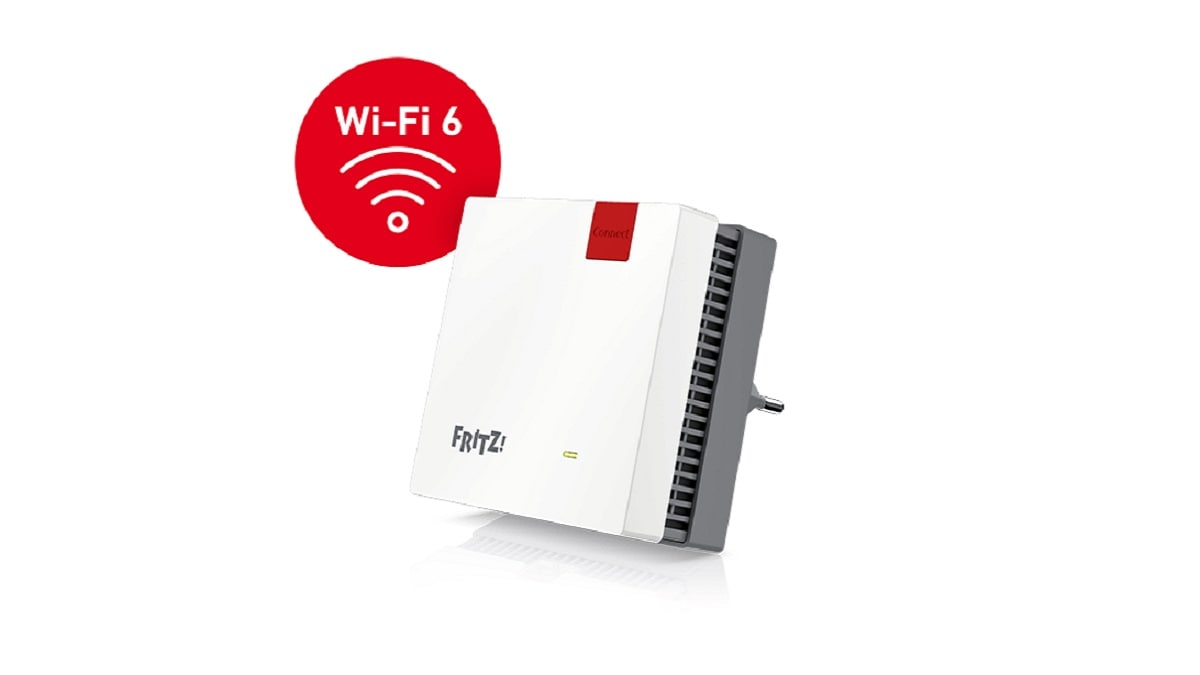In a home network it is very difficult for the router used to access the Internet to be in the geometric center of the apartment. Usually the router is located in the point where we have the first telephone socket or in any case on a perimeter wall. The end result is that, if we have a rather large house or with many obstacles, in some places the WiFi signal could be bad. Therefore, we have need a device that can extend the range of our wireless network: a repeater. These types of apparatuses have already existed for several years, each with its strengths and weaknesses. In this review we are going to analyze the Fritz! Repeater 1200 AX to understand what sets it apart from the competition.
Few elements, but well integrated
A repeater, if you ask a network technician, is nothing more than a plastic box with two network cards: one collects a signal and the other repeats it (hence the name) renewing its transmission energy. The Fritz! Repeater 1200 AX we see in this review does exactly that, however, combining cutting-edge network technologies with great ease of use.
The three elements on which this repeater relies are: Next generation WiFithe possibility of create a unique network with your router: (a so-called mesh network) and the availability of a physical network card. Let’s now look at these features one by one.
WiFi 6
The WiFi system available in this product makes use of the new 802.11ax standard (hence its name) marketed as WiFi (generation) 6. WiFi 6 adopts a called transmission technique MIMO (Multiple In/Multiple Out) which, simplifying as much as possible, makes use of several antennas to optimize the use of the transmission spectrum. This technique allows you to increase the transmission capacity and at the same time obtain better performance in crowded environments. This is not to be overlooked, given the growing number of connected devices we have at home. Moreover, thanks to the introduction of a methodology that takes the name of TWT (Target Wake Time) is possible save energy for mobile devices improving the performance of their batteries.
Obviously, all this works very well if the device that uses the repeater is also WiFi 6. This, unfortunately, is the case for a minority of equipment on the market today. However, it is not impossible to benefit even with devices that use classic WiFi, as discussed in the review of the Fritz! Box 7950 AX (natural companion of this repeater) that we recommend you read.
Mesh

When we extend the range of a WiFi network we don’t want to get different networks in contact with each other, because every time a user moves their mobile devices they will have to connect to the new network, authenticate themselves and take a new address by dropping all connections in progress. What we need is to replicate the situation we normally find in hotels and airports: one large WiFi network with a multitude of access points. When we move our laptop will simply switch from one access point to another based on the signal quality but without switching networks. This, in jargon, is called a mesh network.
If we want to extend our WiFi mesh with the Fritz! Repeater 1200 AX, all we have to do is give him the access data to the network, and he will do everything else. The devices we have in the house will not even need to know that the repeater exists, because for them it will be a single network. The various devices that make up the mesh will take care of optimizing the channels and dividing the devices in such a way as to maximize the use of the available bandwidth.
Of course, it must be said, this magic works the moment it too the rest of the mesh consists of AVM repeaters and routers. However, it is difficult to consider this a real flaw, because the same constraint also exists for enterprise equipment: all access points must be from the same manufacturer or, at a minimum, be certified by the manufacturer of the main infrastructure.
The physical network card
The repeater also comes equipped with a physical network card (those with the cable, so to speak) with a capacity of 1 Gbps. So the Fritz! Repeater it can act as a bridge between two WiFi networks but also between a wired network and a WiFi network.
At first glance, this does not seem to be of much use, since we use WiFi precisely to prevent the network cable from reaching all corners of our home. However, there are at least two situations where it can be an advantage.
The first situation is when we need to set up an area with WiFi coverage completely separate from the main network; because it is too far from our router or because the signal cannot physically arrive. Think about a small office with a meeting room in a different part of the building. It could be possible to install two access points, which will then be managed, or to run a cable and bring the meeting room inside the office mesh for much less.
The second situation is when we don’t have a WiFi network available. Maybe because we have a slightly old router or because our operator does not provide it. We just need to connect the repeater to the router and we will have a WiFi network available. Network that will be transparent to our operator.
The simplicity of installation

This, let’s face it, has always been a distinctive quality of the equipment produced by AVM. The moment we insert the repeater into a power socket it will activate its own WiFi network to which we will have to connect (the data is printed on the back of the device). By connecting to the network, we will be able to configure using a browser. The three (!) Information that we will have to give are: the language you want to use for the menus, if the router is reached via WiFi or with the wired network and the credentials for the WiFi. After that, we can safely forget about its existencebecause all the network operating parameters will be inherited from the Fritz! Box router.
There is obviously a configuration menu accessible via a browser, but it is an interface that is mostly informative and we will get our hands on it only if we need to change the transmission parameters of the antennas.
Also for the location of the repeater we will not be left alone: the led on the box will tell us if the signal is sufficient for its operation. A green LED will mean that the signal is sufficient while an orange LED will be a signal to look for a better location.
Defects? One, but physical
If we really have to find a flaw during this review, then you should know that when looking at the Fritz! Repeater 1200 AX from behind, it turns out to be a physical flaw. That is, the box is square and, probably for engineering reasons, the power connector is located in the center. This means that whether we power the repeater on the wall or with a power strip (also called a power strip) we will obstruct the two adjacent sockets, making them unusable. If the power supply had been placed on one of the edges, it could be played a little better.
The Fritz! Repeater 1200 AX review at a glance
A repeater is a network device as simple as it is useful and the discriminating factor for its liking is often the ease of integrating it into an existing network. AVM makes installation a breeze and relaunches with the 6th generation WiFi and giving the opportunity to also extend a physical network.
The Fritz! Repeater 1200 AX is in our opinion a great buy for both home use and a small / medium office. What you really need is just an unused outlet.















Leave a Reply
View Comments